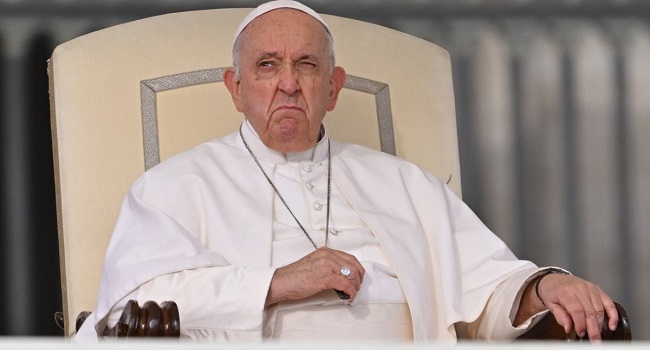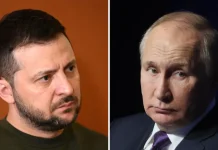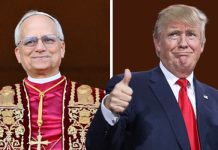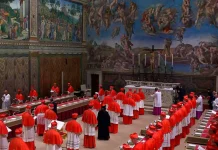Leaders in Ukraine vehemently rejected Pope Francis’s suggestion of negotiations with Russia to bring an end to the war — his use of the words “white flag” drawing particular scorn — reiterating that the country would never surrender.
In a recent interview, Francis used the term “white flag,” repeating the words of a journalist, which some read as a call to surrender.
President Volodymyr Zelensky responded to the pope without naming him in his nightly address Sunday.
Praising Ukrainian chaplains on the front line, Zelensky said: “This is what the church is — it is together with people, not two and a half thousand kilometers away somewhere, virtually mediating between someone who wants to live and someone who wants to destroy you.”
Ukrainian President Volodymyr Zelensky dismissed Pope Francis’s suggestion of negotiations with Russia as virtual mediation in his nightly address March 10. (Video: Reuters)
Foreign Minister Dmytro Kuleba urged the Vatican to support the Ukrainian people “in their just struggle for their lives,” writing: “Our flag is blue and yellow. Under it, we live, die, and triumph. We will not raise any other flags.” He thanked Francis for his prayers for peace and urged him to visit Ukraine.
The pope’s remarks were made in an interview with Swiss broadcaster Radio Télévision Suisse, recorded in February, part of which was released Saturday. The full interview is set to air March 20.
According to a transcript translated and shared by the Vatican news agency, interviewer Lorenzo Buccella asked Francis: “In Ukraine, some call for the courage of surrender, of the white flag. But others say that this would legitimize the stronger party. What do you think?”
Francis responded by saying that, in his opinion, the stronger side is the one “who has the courage of the white flag, to negotiate.”
The controversy prompted a clarification from the Vatican.
“The Pope uses the term white flag, and responds by picking up the image proposed by the interviewer, to indicate a cessation of hostilities, a truce reached with the courage of negotiation,” spokesman Matteo Bruni said in a statement, adding that the Pope stated that negotiations are never a “surrender.”
Though he has often condemned the war in Ukraine, Francis has provoked debate within the church over whether his messaging on the conflict has been too cautious and too focused on maintaining ties with the Russian Orthodox Church. His supporters argue that maintaining neutrality has long been at the center of Holy See diplomacy.
In May 2023, after his first private meeting with Francis following the outbreak of war, Zelensky said any peace formula “must be Ukrainian” and any role of the Vatican must be in service to Ukraine’s peace formula.
Ukrainian church leaders and Ukraine’s allies, too, pushed back against the pope’s latest remarks.
Sviatoslav Shevchuk, the head of Ukraine’s Greek Catholic Church, told a prayer gathering in New York that no one in Ukraine “even thinks of surrendering,” the same day that part of the interview was released. A later statement by church leaders said they would not “dwell” on the pope’s remarks and instead emphasized that Ukraine is a victim of Russia’s aggression.
“How about, for balance, encouraging Putin to have the courage to withdraw his army from Ukraine?” Polish Foreign Minister Radek Sikorski wrote on X. “Peace would immediately ensue without the need for negotiations.”
On Monday, Russia used the pope’s statement to criticize Kyiv for refusing to negotiate and accept Russia’s terms.
Russian officials have made it clear that the Kremlin’s terms for peace — unchanged since Moscow’s 2022 invasion — include retaining Crimea and four other regions that it illegally claimed to annex in 2022, as well as Ukraine’s “demilitarization,” a demand that would leave Ukraine with a neutral status and no army to defend itself. Moscow is also demanding what it calls “denazification” of Ukraine, effectively requiring regime change.
“On the whole, his idea is quite understandable,” Peskov said in a conference call with journalists, referring to Francis. “He has spoken in favor of negotiations. As you know, our president has repeatedly voiced our readiness and openness to solving our problems at talks. That would be preferable.”
“But unfortunately, as you know, both the pope’s comments and numerous statements by other sides, including us, have lately run into the harsh denials of the Kyiv regime, which does not allow for the possibility of any negotiations,” Peskov said.












